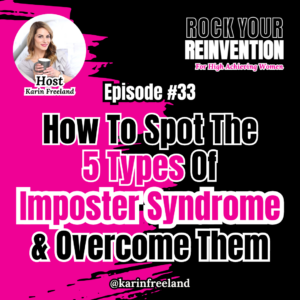Do you ever feel like a fraud that doesn’t belong?
Spoiler Alert – you are NOT the only woman hiding this dirty little secret from the rest of the world! Most high-achievers, especially women, experience feelings of imposter syndrome, afraid someone will discover they are not as capable as they seem and hiding any sign of weakness that they can. And, if you’re thinking, “I don’t have those feelings at work, so this doesn’t apply to me!” – you might be wrong!
Most people associate feelings of imposter syndrome with their professional life only. Still, the ugly truth is that it can strike anywhere, including at home, your kid’s school, the family get-together, and so on.
Have you ever lied to a friend or family member about how you’ve been doing, feeling ashamed to admit that things are not going great? Or have you downplayed your achievements as though they were no big deal, even though you worked hard and achieved something remarkable?
I hate to break it to you, but that is imposter syndrome, and no one is exempt from feeling this way!
Many moms I have worked with have spoken about how inadequate they feel as a parent. Similarly, many women in the corporate world express feelings like they don’t measure up to their peers, even though they have achieved incredible things.
So, what can you do?
In the book written by imposter syndrome expert Dr. Valerie Young, “The Secret Thoughts of Successful Women,” Dr. Young shares the number one way to start combating these feelings is to understand the different types of imposter syndrome and which ones you are particularly vulnerable to.
From the perfectionist who sets impossibly high expectations for themselves to the superwoman who is expected to do the impossible, recognizing which type of imposter syndrome you are struggling with can help you to start challenging those thoughts and feelings.
But first, I want to talk about the signs of imposter syndrome so you can determine if this is what you’re struggling with.
What Is Imposter Syndrome?
Imposter syndrome, also known as the “imposter phenomenon,” is a term to describe feelings of inadequacy and self-doubt. And even though high achievers most commonly experience this, it can affect anyone.
Imposter syndrome is caused by a combination of factors, including:
- unrealistic expectations of yourself;
- holding yourself to impossibly high standards;
- fear of failure and rejection;
- low self-esteem;
- perfectionism;
- comparison to those around you.
It can also stem from feeling like an “outsider” or not belonging in specific settings or environments.
Want to learn more about the 5 Types of Imposter Syndrome? Listen to episode #33 of Rock Your Reinvention for more insights!
My Own Experience With Imposter Syndrome
Unfortunately, imposter syndrome affects more than half of women, myself included! I can’t even begin to tell you how often I have felt imposter syndrome, at work, as a parent, and even as a friend.
There’s one story in particular that always stands out in my memory. I was traveling on the corporate jet for work with two executives from the company for a charity event. The whole time, I felt like such an imposter. The entire flight, I kept thinking that someone would get on the plane and tell me I was in the wrong place and that I had to get off.
To make matters worse, I had unknowingly sat in the President’s seat when I first got on the plane. When he got on board, he told me to stay seated where I was but then proceeded to lecture me for five minutes that I was the most junior person on the team, so I should be sitting at the back of the plane (by the bathroom).
I experienced so much imposter syndrome on that trip that I couldn’t even enjoy myself or take pride in being part of the charity event. That right there is the problem with imposter syndrome. It takes away your power and joy in life! It robs you of your confidence.
Recognizing it within ourselves can be challenging, but if we understand its presence, we can begin the journey toward overcoming it.
Signs Of Imposter Syndrome
So, how do you know for sure if what you’re feeling is imposter syndrome? Well, there are many symptoms of imposter syndrome you can look out for.
A common one is having feelings of self-doubt. This self-doubt could be about your qualifications, skills, accomplishments, and worthiness. It can cause you to discredit yourself or feel like a fraud.
Another sign is hard work in an effort to be sure no one can find any fault in the job you are doing. Have you ever thought I won’t feel like an imposter if I work harder and longer hours than everyone else? Doing that is a clear sign of imposter syndrome. And it can be particularly amplified in a lot of the BIPOC women I speak with who constantly feel like they have something to prove.
Many people who experience imposter syndrome also have anxiety, engage in negative self-talk, and feel like they are never good enough.
By now, you should have a better understanding if it is imposter syndrome you’ve been feeling or not. If it is, then it’s time to learn which imposter syndrome type (or types,) you are.

The 5 Types of Imposter Syndrome
In total, there are five imposter syndrome types. By understanding each type, you will be able to identify which one you’re struggling with and, in turn, be better able to address it.
The Perfectionist
The first type is the perfectionist, which also happens to be the most common imposter syndrome type. This type of imposter syndrome is characterized by a fear of failure and a need to be perfect.
Perfectionists tend to set high standards for themselves, focusing more on avoiding mistakes rather than taking risks. Any small mistake can be interpreted as a failure, and this can cause feelings of shame or guilt.
The Natural Genius
A feeling of entitlement characterizes the natural genius type of imposter syndrome and is most often experienced by high achievers. Natural geniuses often expect things to come quickly and naturally without effort. This can lead to frustration when they don’t get the desired results.
Most of the time, this imposter syndrome type stems from achieving high academic success in your younger years without much effort. So, when faced with a more difficult task, you may feel discouraged if you can’t reach your expectations.
The Rugged Individualist
The rugged individualist type of imposter syndrome is all about feeling like you don’t need anyone else to help you succeed. People with this type feel like they have to do it all on their own, without help from others. This type is also characterized by a fear of vulnerability and difficulty asking for help.
Unfortunately, this can be dangerous, because sometimes there are tasks that can only be achieved with the help of others. Furthermore, when you work on a team, an unwillingness to actually work as part of that team can be detrimental to morale, progress, etc.
The Expert
The expert type of imposter syndrome is all about feeling like you’re not an actual expert in the field you’re working in. This type can be challenging to overcome because it’s rooted in a feeling of insecurity and doubt, which can have a negative effect on motivation.
People with this type often feel like they’re not smart enough or experienced enough, resulting in feelings of inadequacy. They spend their time learning a new skill, taking extra courses, or researching to be “the expert,” but they never quite feel good enough. So, they continue to experience imposter syndrome on the quest to become the absolute expert.
The Superwoman/Superman
The fifth and final imposter syndrome type is the superwoman/superman type. People with this type set unrealistic expectations for themselves, and when they don’t meet those expectations, they feel like a failure.
Anyone struggling with this imposter syndrome type will often try to outwork and out achieve their peers to prove themselves. They may also simultaneously take on too many tasks or projects, trying to do it all.
What You Can Do To STOP Feeling Like An Imposter
If you think this is just my personality type and can’t be changed, I want you to read this part repeatedly until it sinks in!
You can do something to manage imposter syndrome.
It doesn’t have to stay with you for the rest of your life.
You deserve to feel confident in your shoes, celebrate your successes, and have the courage to take risks.
With that said, here are some things you can do to start changing your thoughts and feelings that are giving you imposter syndrome.
Tip #1 – Ask Yourself The Cold Hard Truth
Pretend you are talking to a friend instead of yourself, and ask yourself the cold hard truth – is this true? Is it true that you aren’t good enough, smart enough, or experienced enough? If the answer is no, accept that answer, and don’t let yourself be held back by your negative thoughts.
Tip #2 – Give Yourself Credit Where It’s Due
Take an inventory of all your successes in your life and career so far. Give yourself credit for your accomplishments, and take pride in your hard work. Remember that success is about the results you achieve and how much effort you put in. Also, when you’re given positive feedback, take it and don’t refute it.
Tip #3 – Let Go Of Perfectionism
Instead of viewing mistakes as failures, look at your mistakes as learning lessons. Doing this will help you overcome your perfectionism and look at the bigger picture instead. It’s also helpful to remind yourself that no one is perfect, and you don’t need to be either.
Tip #4 – Set Boundaries In Your Life
Setting boundaries can be a great way to help manage imposter syndrome. Not only does this allow you to step back from the situation and look at it objectively, but it also helps you to set realistic expectations for yourself. Setting boundaries can also help protect your mental health and reduce overwhelming feelings.
Tip #5 – Set Realistic Goals
It can be easy to get overwhelmed when trying to reach a goal, so take the time to break it down into smaller achievable steps. Doing this can help you stay focused and motivated without getting wrapped up in feelings of being a fraud.
Tip #6 – Practice Self-Compassion & Self-Care
Taking the time to practice self-compassion and self-care is essential when managing imposter syndrome. You can do this by treating yourself with kindness, nurturing your mind and body, taking breaks from work when needed, and not being so hard on yourself.
Tip #7 – Quit Comparing Yourself To Others
We all know that comparison is the thief of joy, especially concerning imposter syndrome. Getting caught up in comparing yourself to others is easy, but this will only lead to more self-doubt and insecurity. Take the time to remind yourself of your unique abilities and strengths, and celebrate others’ successes without letting them bring you down.
By taking the time to reflect on your abilities and accomplishments, practice self-compassion & self-care, set boundaries in your life, and most importantly, quit comparing yourself to others – you can start to feel more confident in who you are and what you have to offer the world!
The takeaway is that no matter how complex imposter syndrome may seem, you can take steps to overcome it. It’s not easy, but with the right strategies and mindset, you can start feeling more confident and capable of taking on whatever life throws. So have faith in yourself, and don’t let the fear of failure hold you back!
Do you want more insights on how you can overcome Imposter Syndrome? Listen to episode #33 of Rock Your Reinvention – How To Spot The 5 Types of Imposter Syndrome & Overcome Them.

